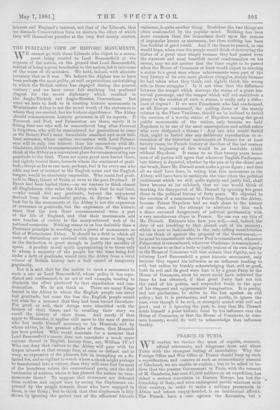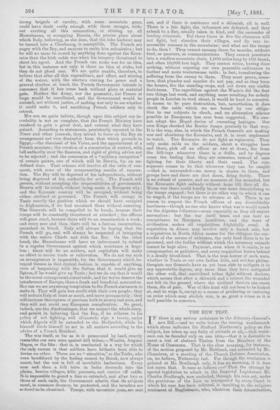FRANCE IN TUNIS.
WE confess we receive the mass of reports, rumours, official utterances, and telegrams from and about Tunis with the strongest feeling of incredulity. Why the Foreign Office and War Office of France should keep up such a mystification, and connive at such an extraordinary amount of falsehood, we are unable to explain ; but to be asked to be- lieve that the present Government in Paris, with the consent of M. Gambette, has sent 25,000 soldiers on an expedition, has risked a serious convulsion in Eastern Europe, has lost the friendship of Italy, and even endangered pacific relations with that country, in order to make a military promenade in Africa and return empty-handed, is an intellectual affront. The Trench have a case against the Kroumirs, but a
strong brigade of cavalry, with some mountain guns, could have dealt easily enough with those savages, with- out exciting all this commotion, or stirring up all Mussulmans, or occupying Biserta, the precise place about which Italy, believing, as she does, that the lake harbour may be turned into a Cherbourg, is susceptible. The French are angry with the Boy, and anxious to make him submissive ; but he will no more be cowed by anything done against the Krou- mire than the Irish noble was when his tenantry threatened to shoot his agent. And the French can make war for an idea, but in this instance not only is there no idea at stake, but they do not plead one. We are quite unable, therefore, to believe that after all this expenditure, and effort, and stirring of the waters, with the electors craving for peace and a general election at hand, the French Government intends to announce that it has come back without glory or material gain. Neither the Army, nor the peasantry, nor France at large would be conciliated, and the Government would be accused, not without justice, of making war only to see whether it could make it, and sacrificing French soldiers only to retreat.
Nor can we quite believe, though upon this subject our in- credulity is not so complete, that the French Ministry have resolved to gain a great deal, and conceal what they have
gained. According to statements, persistently repeated in the lines and other journals, they intend to force on the Bey an
arrangement not very dissimilar from that which prevails in Egypt,—the dismissal of his Vizier, and the appointment of a French nominee ; the creation of a commission of control, with full authority over the finances, and right of giving advice not to be rejected ; and the concession of a "military occupation" of certain points, one of which will be Biserta, for an un- defined time. That scheme will involve all the evils of con- quest, with none of the compensating results of annexa- tion. The Bey will be deprived of his independence, without being deprived of hie authority for evil. The French will govern, without accepting the responsibilities of government. Biserta will be seized, without being made a European city ; and the Kroumir country will be occupied, without being either civilised or governed. The French will occupy in Tunis exactly the position which we should have occupied in Afghanistan, if we had remained there without annexing.
The Generals will be compelled to be harsh, because their troops will be constantly threatened or attacked ; the officers will grow cruel, because there will be an assassination a week ; and every pow and then there will be a furious insurrection, quenched in blood. Italy will always be hoping that the French will go, and will always be suspected of intriguing with the native Chiefs and with the Bey. On the other hand, the Mussulrnans will have no inducement to submit to a regular Government against which resistance is hope- less ; there will be no settlers, and capitalists will make no effort to revive trade or cultivation. We do not say such an arrangement is impossible, for the Government which be- trayed Greece in that cynical fashion is capable of anything, even of bargaining with the Sultan that it would give up Epirus, if he would give up Tunis ; but we do say that it would be the worst arrangement conceivable, and far better deserve the interference of Europe, than-a frank and beneficial annexation.
Ncr can we see anystrong temptation to the French statesmen to make it. They will gain less credit with their own people; they will irritate Italy at least as much, and more permanently ; they will increase the expense of garrison both in money and men, and they will not avoid any European complication. So great, indeed, are the disadvantages, that we suspect the whole story, and persist in believing that the Boy, if he adheres to his policy of not fighting, will ultimately sign a treaty, under which Algeria will be extended to the Medjerdab, while he himself binds himself to act in all matters according to the advice of a French Resident.
The war itself, so far as it is prosecuted by land, exactly resembles our own wars against hill tribes,—Wuziris, Angami ragas, or the like ; that is, is conducted in a way for which the only excuse is that soldiers have hitherto been able to devise no other. There are no " atrocities," as the Turks, who were bewildered by the feeling caused by Batuk, now always assert, but the war is full of inevitable barbarisms. Every now and then a bill tribe in India descends into the pitting, harries villages, kills peasants, and carries off cattle.
h is impossible to guard a line so extended, and after two or three of such raids, the Government admits that its subjects must, in common decency, be protected, and the invaders are ordered to be chastised. Troops, with mountain guns, are sent
out, and if there is resistance and a skirmish, all is well. There is a fair fight, the tribesmen are defeated, and they submit to a fine, usually taken in kind, and the surrender of leading criminals. But three times in five the clansmen will not fight, but abandon their villages, and fly into in- accessible recesses in the mountains ; and what are the troops to do, then ? They cannot encamp there for months, without food, or quarters, or communications. They cannot penetrate into a roadless mountain chain, 1,000 miles long by 100 broad, and often 10,000 feet high. They cannot retire, having done nothing, without exposing our own peaceable cultivators to further and more venturesome raids ; in fact, transferring the suffering from the enemy to them. They must prove, some- how, that plunder and murder do not pay, and so they burn the houses, fire the standing crops, and cut down any visible fruit-trees. The expedition against the Wuziris did the first two things last week, and anything more revolting for orderly people in London to read about, it would be hard to conceive. It seems to- be pure destruction, but, nevertheless, it does check the raids which we aro bound by our obliga- tion to our subjects to check, and no alternative scheme possible to Europeans has ever been suggested. We can- not adopt the Mogul device of executing hostages. Our own Kings checked the Border forays precisely in that way. It is the way, also, in which the French Generals are making war and chastising the Kroumirs, and it is most unpleasant to watch. The Kroumirs do not fight as regiments. They only make raids on the soldiers, shoot a straggler here and there, pick off an officer or two at dawn, fire from the hill-tops whenever there is a defile, and by degrees rouse the feeling that they are assassins, instead of men fighting for their liberty and their creed. The con- sequence comes to be that whenever they can be caught —that is, surrounded—no mercy is shown to them, and groups here and there are shot down, firing feebly. There is no refusal of quarter, and no massacre of the wounded, but the Kroumirs fight sullenly without hope till they all die. Worse war there could hardly be, or war more demoralising to the troops engaged ; but there is no other way in which it can be waged, if the troops are to advance at all. There is no reason to suspect the French officers of any discreditable harshness—though no one who knows what war is would vouch for the Algerine followers—more especially as they all expect annexation ; but the war itself bears and can bear no resemblance to European hostilities, and the want of civilisation makes all requisitions frightfully cruel. A requisition in Alsace may involve only a forced sale, but a requisition in North Africa means for the villagers the sur- render of the means of existence, the only food there is to be procured, and the fodder without which the necessary animals cannot be kept alive. Payment, even when it is made, is no compensation or palliative, and every requisition leaves behind it a deadly blood-feud. That is the true horror of such wars, whether in Tunis or our own Indian hills, and neither philan- thropists nor Generals have as yet been able to mitigate it in any appreciable degree, any more than they have mitigated the other evil, that uncivilised tribes fight without doctors, which means that after a skirmish and a retreat the wounded not loft on the ground, where the civilised doctors can reach them, die of pain. War of this kind will not bear to be looked at, and to wage it, except as a means of producing or restoring an order which may abolish war, is as great a crime as it is well possible to conceive.



































 Previous page
Previous page